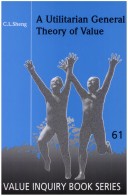Value Inquiry Book
1 primary work
Book 61
The thesis of this book is to develop a theory of value covering all kinds of values, based on my unified utilitarian theory. It is unique and is different from all traditional and existing theories of value.
Like the views of most psychologists and decision-scientists, value is asserted to be subjective in nature because value exists only for a subject.
Value and value judgment are considered statistical in nature in three dimensions, namely in the dimensions of subject, object, and judge.
This theory covers a modified von Neumann-Morgenstern utility theory as an integral part. The three conceptions of utility held by philosophers, economicsts, and decision-scientists are unified.
The traditional and conventional classification of value into intrinsic and instrumental, which may lead to confusion, misunderstanding, and circularity, is not used. Instead, a classification based on the classification of good things in life according to the principle of exchangeability and replaceability is emphasized and used.
A decision-theoretic approach is taken for the study of actions in life. All the actions in a person's life are for the pursuit of values, and all the values pursued are related, directly or indirectly, closely or remotely, to a life plan. Thus, this utilitarian general theory of value eventually leads to a philosophy of life, which is also consequential, teleological, and utilitarian.
Like the views of most psychologists and decision-scientists, value is asserted to be subjective in nature because value exists only for a subject.
Value and value judgment are considered statistical in nature in three dimensions, namely in the dimensions of subject, object, and judge.
This theory covers a modified von Neumann-Morgenstern utility theory as an integral part. The three conceptions of utility held by philosophers, economicsts, and decision-scientists are unified.
The traditional and conventional classification of value into intrinsic and instrumental, which may lead to confusion, misunderstanding, and circularity, is not used. Instead, a classification based on the classification of good things in life according to the principle of exchangeability and replaceability is emphasized and used.
A decision-theoretic approach is taken for the study of actions in life. All the actions in a person's life are for the pursuit of values, and all the values pursued are related, directly or indirectly, closely or remotely, to a life plan. Thus, this utilitarian general theory of value eventually leads to a philosophy of life, which is also consequential, teleological, and utilitarian.
